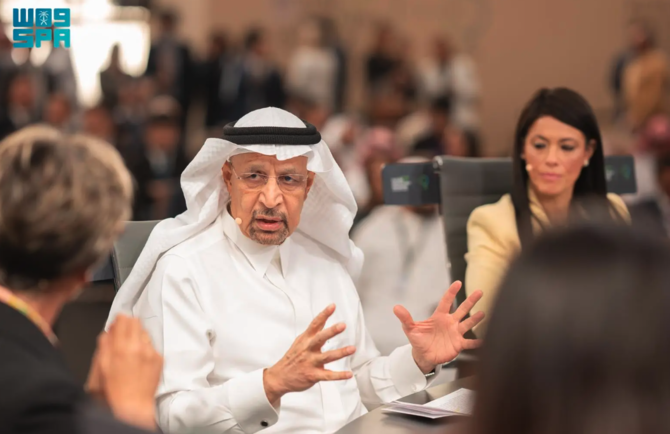
Saudi Arabia's FDI Quadruples, Surpassing Vision 2030 Targets: Minister
Riyadh, Saudi Arabia — The Kingdom's foreign direct investment has seen a remarkable fourfold increase, exceeding the targets set by its ambitious Vision 2030. This significant growth, announced by Investment Minister Khalid Al-Falih at FII9 in Riyadh, underscores the nation's successful economic diversification efforts away from oil dependency.
At the Future Investment Initiative (FII9) in Riyadh, Saudi Arabia's Investment Minister, Khalid Al-Falih, reported that the country has witnessed a significant surge in foreign direct investment.
This growth has not only exceeded the projected targets set by Vision 2030 but also highlights the transformative changes underway within the Saudi economy.
According to official figures, foreign direct investment into the Kingdom reached $31.7 billion in 2024, representing a 24 percent increase and establishing it as a prominent global investment destination.
This upsurge is attributed to major projects, preparations for hosting Expo 2030, and the 2034 FIFA World Cup.
The minister's announcement comes at a time when the non-oil sector of the Saudi economy has risen to contribute about 5 percent to the national output, marking a substantial shift in the economic structure.
Over the past two years, new and promising investment opportunities have emerged, particularly in artificial intelligence and digital transformation sectors.
These developments are supported by ongoing major national projects, with several preparing to open to the public.
Khalid Al-Falih emphasized that 40 percent of Saudi Arabia's state budget and expenditures are now funded through non-oil revenues.
Furthermore, a striking 90 percent of foreign direct investment flowing into the country is directed toward non-oil sectors, indicating a clear commitment towards economic diversification.
The minister outlined several advanced fields including manufacturing, technology, tourism, entrepreneurship, deep tech, and venture capital that have seen significant progress.
Al-Falih also highlighted Saudi Arabia's resilience in navigating global challenges such as the COVID-19 pandemic, oil price fluctuations, and regional geopolitical tensions.
He attributed this to the nation's robust financial reserves and stability, which he noted are key strengths driving forward its economic transformation.
The minister expressed optimism about partnerships between the government, private sector, and foreign investors, pointing out that major infrastructure projects like the Red Sea Project are now advancing towards completion.
Looking ahead, there is a recognized need for the Kingdom to transition some of these large-scale projects into the private sector to allow for more efficient management under market conditions.
This approach reflects Saudi Arabia's commitment to reducing barriers to international businesses and continuing to welcome global capital with an open-door policy.
Colleagues and participants at FII9 concurred, stressing that collaborative efforts are vital for achieving objectives in a timely manner.
They pointed out the potential within energy-related sectors for innovation and building a sustainable future for humanity.
This growth has not only exceeded the projected targets set by Vision 2030 but also highlights the transformative changes underway within the Saudi economy.
According to official figures, foreign direct investment into the Kingdom reached $31.7 billion in 2024, representing a 24 percent increase and establishing it as a prominent global investment destination.
This upsurge is attributed to major projects, preparations for hosting Expo 2030, and the 2034 FIFA World Cup.
The minister's announcement comes at a time when the non-oil sector of the Saudi economy has risen to contribute about 5 percent to the national output, marking a substantial shift in the economic structure.
Over the past two years, new and promising investment opportunities have emerged, particularly in artificial intelligence and digital transformation sectors.
These developments are supported by ongoing major national projects, with several preparing to open to the public.
Khalid Al-Falih emphasized that 40 percent of Saudi Arabia's state budget and expenditures are now funded through non-oil revenues.
Furthermore, a striking 90 percent of foreign direct investment flowing into the country is directed toward non-oil sectors, indicating a clear commitment towards economic diversification.
The minister outlined several advanced fields including manufacturing, technology, tourism, entrepreneurship, deep tech, and venture capital that have seen significant progress.
Al-Falih also highlighted Saudi Arabia's resilience in navigating global challenges such as the COVID-19 pandemic, oil price fluctuations, and regional geopolitical tensions.
He attributed this to the nation's robust financial reserves and stability, which he noted are key strengths driving forward its economic transformation.
The minister expressed optimism about partnerships between the government, private sector, and foreign investors, pointing out that major infrastructure projects like the Red Sea Project are now advancing towards completion.
Looking ahead, there is a recognized need for the Kingdom to transition some of these large-scale projects into the private sector to allow for more efficient management under market conditions.
This approach reflects Saudi Arabia's commitment to reducing barriers to international businesses and continuing to welcome global capital with an open-door policy.
Colleagues and participants at FII9 concurred, stressing that collaborative efforts are vital for achieving objectives in a timely manner.
They pointed out the potential within energy-related sectors for innovation and building a sustainable future for humanity.











